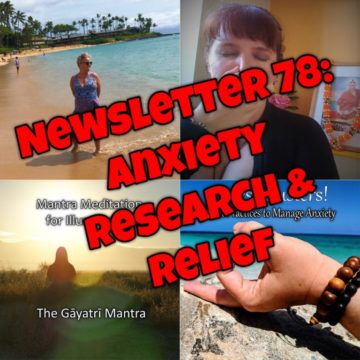
Have you ever had one of those months where it seems like everything that could go wrong is going wrong? Those times when things are so challenging that you just want to crawl into a hole and never come out? I can hear one of my friends saying “Yeah, try my whole life!” You are not alone in having those overwhelming moments and thoughts. Wouldn’t it be great to eliminate them? Sorry, that is not possible. The goal is to find a sense of balance in the middle of each storm.
Here comes the secret you’ve been waiting for: you must practice. Yes, that’s right, to maintain equilibrium you must develop a practice that cultivates wisdom, stillness, and humility. There is no easy way out, no shortcut, and no magic wand (although it doesn’t hurt if you have one of those). The yoga sūtras say yogas citta vrtti nirodah, a mouthful that means “yoga is to still the waves of the mind”. Not to calm the waves of life, rather eliminate the reactivity of your mind. Imagine being in a chaotic restaurant, with people shouting, babies crying, plates crashing, and you are quiet and undisturbed. Imagine the chaos of your life and see yourself at the center of it all quiet, undisturbed, and content.
Wow, what a vision. It’s not that farfetched. In fact, there have been times in your life when you have had that experience; a moment of stillness and clarity during a crazy scene. Now, what if you could control it? You can. This is what a daily practice is all about. The most important aspects of your daily practice are that you move your body, breathe, turn your focus inwards, practice one-pointed focus, and surrender to what is. All these pieces are found within a yoga practice. Start simply, with five minutes each morning to be quiet and check in with yourself. Try an easy body scan to determine what your body needs. Focus your attention on your emotional and mental bodies, too. Once you have discovered what is needed, make sure that you give that to yourself. The more time that we give ourselves what we need, the less overwhelmed we will be. Try it! More LifeForce Yoga resources and free practices are here to aid you. I promise it will make a difference.
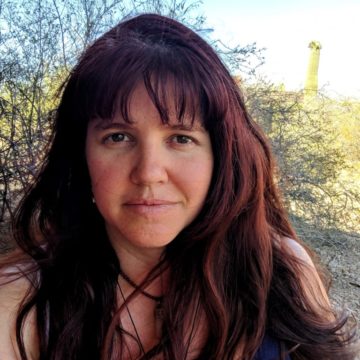
One way to start is with our upcoming online course, Stress Busters! Best Practices for Managing Anxiety. This is a two-part program that comes with a LifeForce Yoga practice video to use in between sessions. Sign up here, and don’t delay! Today through Sunday only we are offering a discount of $5.
As ever, thank you for reading!
Rose Kress
Owner/Director, LifeForce Yoga Healing Institute
NEW VLOG: Weekly Video Logs
In an effort to support positive mental health, Rose has started a weekly video blog, “in COLOR”. Each video is accompanied by a post with more information. You can find them on our website here, and also directly on YouTube, here. Make sure that you subscribe to LifeForce Yoga on YouTube to get automatic updates when these are published (usually on Thursday).
This month, our VLOGs focus on tools for managing ~a~n~x~i~e~t~y~ and this week, Rose Kress reviews research. Turns out that the best practices for anxiety are those that first burn the energy off before we head into relaxation. Take a look, here.
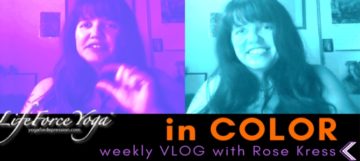
Research Spotlight:Anxiety
Effect of Yoga on Stress, Anxiety, and Depression
52 women in Ilam, Iran participated in a study to investigate the effects of yoga on anxiety, depression, and stress. The study lasted four weeks, with three sessions a week for 60-70 minutes each session. Participants were assessed before and after the 4-week period with the Depression, Anxiety, and Stress Scale -21 (DASS-21). Researchers found that stress, anxiety, and depression were significantly reduced. Researchers noted that one of the limitations of this study was that the effects could not be studied on men as there are no yoga clubs for men. Read the abstract here.
This analysis mirrors a 2015 study that measured the effect of yoga on stress, anxiety, and depression among Turkish adults. In it, 95 individuals (89 women and 6 men) were followed for two weeks. Sessions were 50 minutes long and happened twice a week. Researchers noted a significant reduction in stress, anxiety, and depression. Read this abstract here.
These two studies illustrate that yoga, no matter the kind or the location of practice, can reduce stress, anxiety, and depression. Imagine the results in someone who practices every single day! This begs the question, why is everyone not practicing every day? Accessibility to yoga is a major factor. Not just getting to a class that fits your schedule, but one that meets your specific needs and limitations. The good news is that we have worked hard to provide you with LifeForce Yoga practices and tools that are portable, accessible, and available online all the time! What better time to start than now?
Effect of Alternate Nostril on Experimentally Induced Anxiety
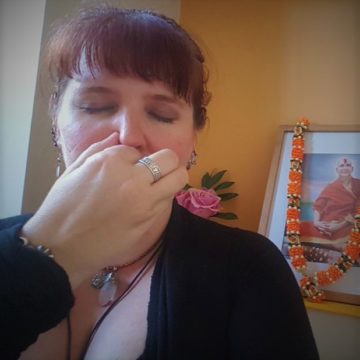 Do you get anxious when you must speak in public? You are not alone. In this study, researchers wanted to look at the effects of Alternate Nostril Breathing on anxiety. To do so, they used the simulated public speaking test (SPST) (yikes, sounds nerve-wracking!). 30 medical students with no prior yoga practice history volunteered and were split into a control group and a test group. The control group sat in a quiet room before participating in the SPST. The test group practiced 15 minutes of Alternate Nostril Breathing before the SPST. When compared with the control group, the test group showed a trend towards lower anxiety — leading researchers suggest a larger study.
Do you get anxious when you must speak in public? You are not alone. In this study, researchers wanted to look at the effects of Alternate Nostril Breathing on anxiety. To do so, they used the simulated public speaking test (SPST) (yikes, sounds nerve-wracking!). 30 medical students with no prior yoga practice history volunteered and were split into a control group and a test group. The control group sat in a quiet room before participating in the SPST. The test group practiced 15 minutes of Alternate Nostril Breathing before the SPST. When compared with the control group, the test group showed a trend towards lower anxiety — leading researchers suggest a larger study.
Speaking from personal experience, yoga practices are cumulative. That is, build up in your system. The more you practice them the better they work, in part because of the changes that happen in your nervous system, brain, and biochemistry. It would be interesting to see this study repeated with an additional group of people that had an established alternate nostril breathing practice.
Last fall we had an Alternate Nostril Breath challenge. Feel free to challenge yourself with this fantastic practice! More information is here. This last study’s abstract is here.
Recovering Connection to Self: Practices for Addiction Recovery
by Kathleen Williams, PhD, LPC, RYT, LFYP2
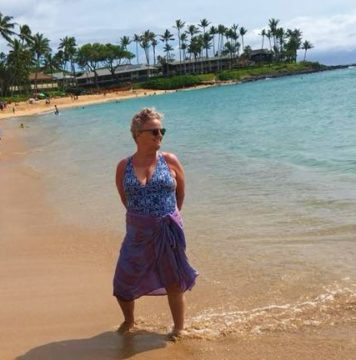 Today’s society lacks a sense of community. The concept of community, extended family, and family, in general, has been lost. This loss can be viewed as the root cause of addiction. People are lonely. We rely on media, the internet, and social media as a means of connection. As a society, we have lost our sense of deeper connection where a person feels cared about and loved. Wild concepts.
Today’s society lacks a sense of community. The concept of community, extended family, and family, in general, has been lost. This loss can be viewed as the root cause of addiction. People are lonely. We rely on media, the internet, and social media as a means of connection. As a society, we have lost our sense of deeper connection where a person feels cared about and loved. Wild concepts.
Addicts have a deep sense of loss and disconnection, although they might not know it. It has been said that at the root of all addiction is trauma and I believe at the root of all addiction is a deep sense of longing – to be loved, to belong, and to fit in, especially after a lifetime of trauma and dysfunction. Read on…
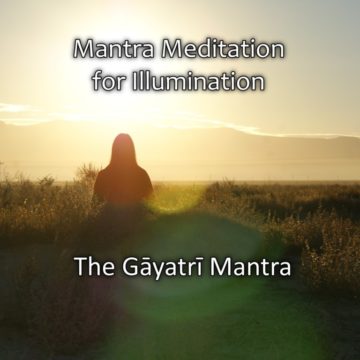 Mantra Meditation for Illumination: The Gāyatrī Mantra
Mantra Meditation for Illumination: The Gāyatrī Mantra
with Rose Kress, ERYT500, C-IAYT, YACEP
Wednesdays July 18 & 25
4 – 5pm Pacific / 7 – 8pm Eastern
$49 — Register now
Mantra, meaning tool of the mind, supports the practitioner in focusing awareness on a specific vibration to cultivate an outcome. Gāyatrī Mantra focuses the mind on the vibration of the light of the Divine. It contains specific mantras meant to illuminate the chakras, which correlate to the layers of the universe. As the chakras become illuminated, these layers of the universe begin to vibrate within and lead one to enlightenment. According to Sant Keshavadas, Gāyatrī Mantra destroys all karmas, purifies the heart and the mind, and grants a healthy body.
Sign up before next week and get $10 off!
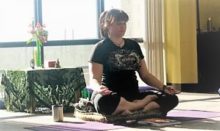 In this two-session online course, you will learn Gāyatrī Mantra, understand it’s meaning, and learn to develop a mantra meditation practice to aid you in focusing your mind. Topics covered in this program include:
In this two-session online course, you will learn Gāyatrī Mantra, understand it’s meaning, and learn to develop a mantra meditation practice to aid you in focusing your mind. Topics covered in this program include:
- The origin of this ancient mantra
- The meaning of Gāyatrī Mantra
- The long and short forms of the mantra
- How to cultivate a mantra meditation practice
- Mudrās to enhance the practice of the Gāyatrī Mantra
Includes a manual for guidance.
If you cannot attend the live sessions, you will be emailed a link to view within 24 hours.
Upon completion of the course, you will be established in a mantra meditation practice. Videos will be available for download (included in the cost of the course) on July 31st.
When I chant the Gayatri, no matter the internal and external weather, I am aware that the sun is rising. When I practice at dawn, I am awake to the light of the Divine, no matter what has clouded my vision the day before. – Amy Weintraub, founder, LifeForce Yoga Healing Institute
January Level 1 Training in Tucson Now Open for Registration!
Led by Director Rose Kress and Trainer Randy Todd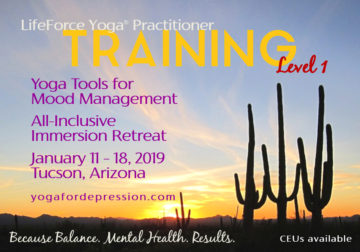
Special Guest Teachers: Amy Weintraub and Maria Mendola
January 11 – 18, 2019
Tucson, Arizona
Our flagship training is now open for Registration. This training is the most special of all of our 7-day programs because of the location in the Tucson Mountains of Southern Arizona. Not only will you experience the life changing effects of LifeForce Yoga, you will get to enjoy 70-degree days when most of the country is plunged in the depths of winter darkness. Watching the sun rise as you practice yoga, feeling its warmth on your skin as you meditate, and enjoy the light as you take an afternoon hike in the desert. Are we biased? Just a bit, Tucson is a pretty unique place.
Our unique training program offers you the opportunity to unwind and declutter your mind while filling yourself with ease, self-care, and techniques for optimum mental health. The personal experience of these
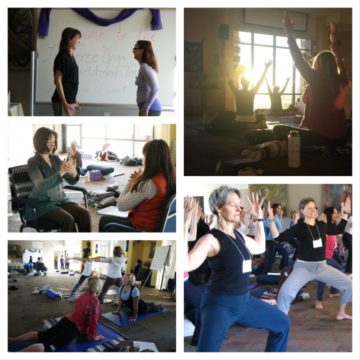
tools gives you greater insight as well as the ability to share what you have learned with others. Together, we can de-stigmatize mental health issues while inspiring and empowering others to be free from suffering. There is no better time than NOW to start your journey with LifeForce Yoga.
More Information About the LifeForce Yoga Training
Private Consultations
Feeling stressed and constricted? Get clarity on your life and your path with a one-on-one consultation with Rose Kress, Owner/Director of Life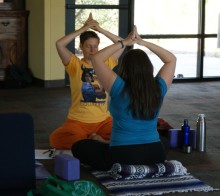 Force Yoga. Explore potent practice options, include breathing, sound, intention, movement, meditation, and integration. Your consultation consists of an assessment, and two 30-minute private Zoom sessions to co-create a home practice unique to you. During the first session, you will discuss your current concerns and your desires for better health. In the second session, Rose will go over the LifeForce Yoga home practice for well-being and ease. More info here.
Force Yoga. Explore potent practice options, include breathing, sound, intention, movement, meditation, and integration. Your consultation consists of an assessment, and two 30-minute private Zoom sessions to co-create a home practice unique to you. During the first session, you will discuss your current concerns and your desires for better health. In the second session, Rose will go over the LifeForce Yoga home practice for well-being and ease. More info here.
I love these newsletters. They are always informative & inspiring!
Thank you Merrill!!